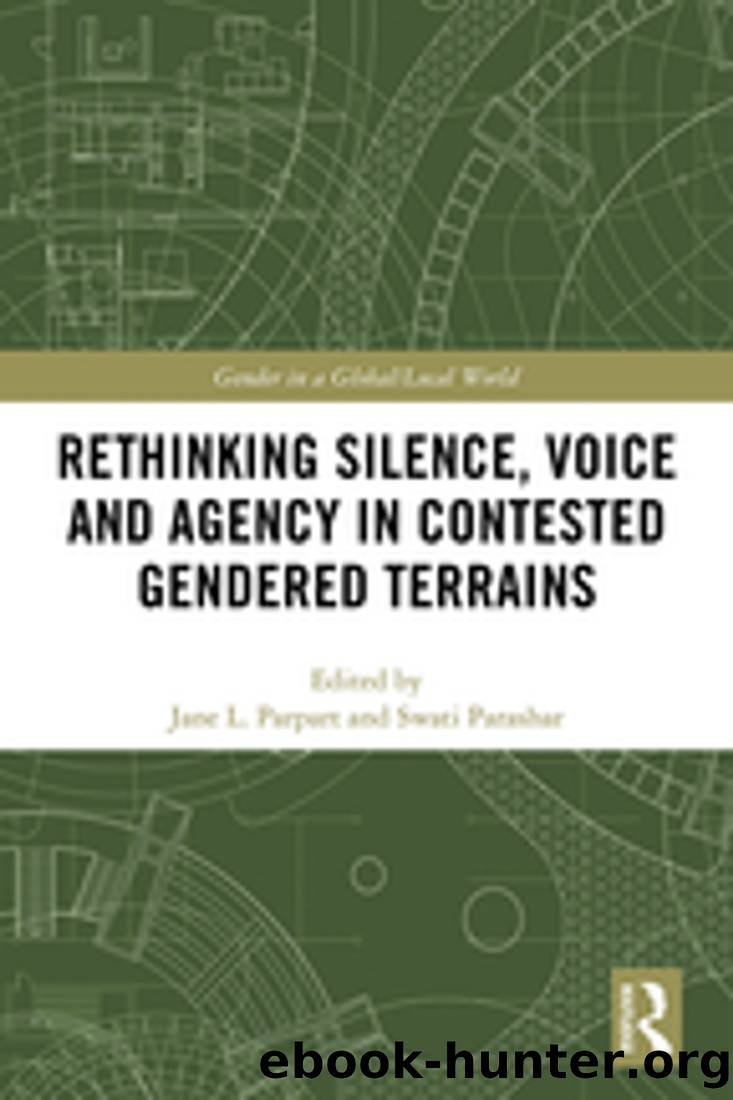Rethinking Silence, Voice and Agency in Contested Gendered Terrains by Jane L Parpart & Swati Parashar

Author:Jane L Parpart & Swati Parashar [Parpart, Jane L & Parashar, Swati]
Language: eng
Format: epub
ISBN: 9780367471613
Google: h8KozAEACAAJ
Goodreads: 49812138
Publisher: Routledge
Published: 2020-02-25T00:00:00+00:00
7Redemption and empowerment among the Bail Boys in Trinidad
Catherine Ali
Intentional silence
Human security in Trinidad is threatened by proliferating gangs. In 2003 there were 25 most wanted gang members, in 2011 there were 110 gangs with 1,027 members and at the beginning of 2018 there were 2,495 gang members, 200 with links to ISIS.1 The government responded by re-introducing the Anti-Gang Bill. Adopting an alternative approach, a two-year experimental Court programme was offered to 30 convicted gang members, who underwent a reflective transformation process that delivered good strategic choices and constructive insights. This chapter considers the depth of reflection that is transforming the lives of these participants and tracks the power dynamics that encourage such change, particularly the role of silent reflection.
What are we doing when we reflect? How does reflection enable development and peace? Why are non-reflective leaders dangerous? I locate these questions in the feminist empowermentâsilence debate, drawing on the work of Parpart, Kabeer, and Underhill to understand silent reflection as a means for finding empowering presence in the absence of sound. I introduce Trinidad and Tobagoâs socio-cultural paradoxes and outline the transformations occurring through the Bail Boys project. I then turn to Bourgeault, Keating and Finley to better understand intentional silence as a way of picking up and exercising inner power for implementing strategic change, and ground this argument in the edges of feminist empowermentâsilence theory (Malhotra and Rowe, 2013).
The silent dynamics of âpower-from-withinâ demonstrated the potential of an experimental court-based restorative justice approach, grounded in a pilot project developed to resolve violent gang conflicts in Trinidad. It aimed to turn around the lives of convicted youth offenders, to facilitate empowerment through mentorship, reflection, agency and the operationalisation of strategic choices, including transforming gender relations. These youths were called Bail Boys (BB) because they were granted the privilege of probation and bail for serious crimes (violent assault, rape, murder) instead of prison, if they performed and maintained their transformative project. They provide an excellent case for exploring the questions raised above, particularly the role of silence in personal empowerment.
Trinidad
The Republic of Trinidad and Tobago (TT) is a twin island state seven miles from Venezuelaâa country in turmoilâand last in the archipelago of islands stretching from Florida across the Caribbean Sea. This small country of 1.4 million, which became independent in 1962, is a complex, multi-ethnic,2 socio-economic mix. Religion is an important part of its multi-religious culture.3 Trinidad, the land of paradox, is known for Carnival and steel-pan, and for being an oil-rich developing country now experiencing severe economic contraction. Even when oil wealth was invested in human development, social inequality and violent crime produced social decline, systems failure, hardship and further polarisation (Parsons and Ali, 2018).
A plantation economy based on slavery and Indian indentured labour in the nineteenth century, has embedded a legacy of hierarchical/dominating power prevalent in social policy and practice (Brereton, 2010). Discrimination between men and women, geographic inequalities, hierarchical structures and roles, have been experienced as reduced agency (Reddock, 1998). Men own more power even
Download
This site does not store any files on its server. We only index and link to content provided by other sites. Please contact the content providers to delete copyright contents if any and email us, we'll remove relevant links or contents immediately.
The Rules Do Not Apply by Ariel Levy(4966)
On the Front Line with the Women Who Fight Back by Stacey Dooley(4872)
The Lonely City by Olivia Laing(4801)
Bluets by Maggie Nelson(4554)
The Confidence Code by Katty Kay(4260)
Three Women by Lisa Taddeo(3433)
Not a Diet Book by James Smith(3422)
Inferior by Angela Saini(3313)
Confessions of a Video Vixen by Karrine Steffans(3308)
A Woman Makes a Plan by Maye Musk(3253)
Pledged by Alexandra Robbins(3176)
Wild Words from Wild Women by Stephens Autumn(3153)
Nice Girls Don't Get the Corner Office by Lois P. Frankel(3044)
Brave by Rose McGowan(2821)
Women & Power by Mary Beard(2767)
Why I Am Not a Feminist by Jessa Crispin(2760)
The Girl in the Spider's Web: A Lisbeth Salander novel, continuing Stieg Larsson's Millennium Series by Lagercrantz David(2721)
The Clitoral Truth: The Secret World at Your Fingertips by Rebecca Chalker(2720)
I Who Have Never Known Men by Jacqueline Harpman(2668)
